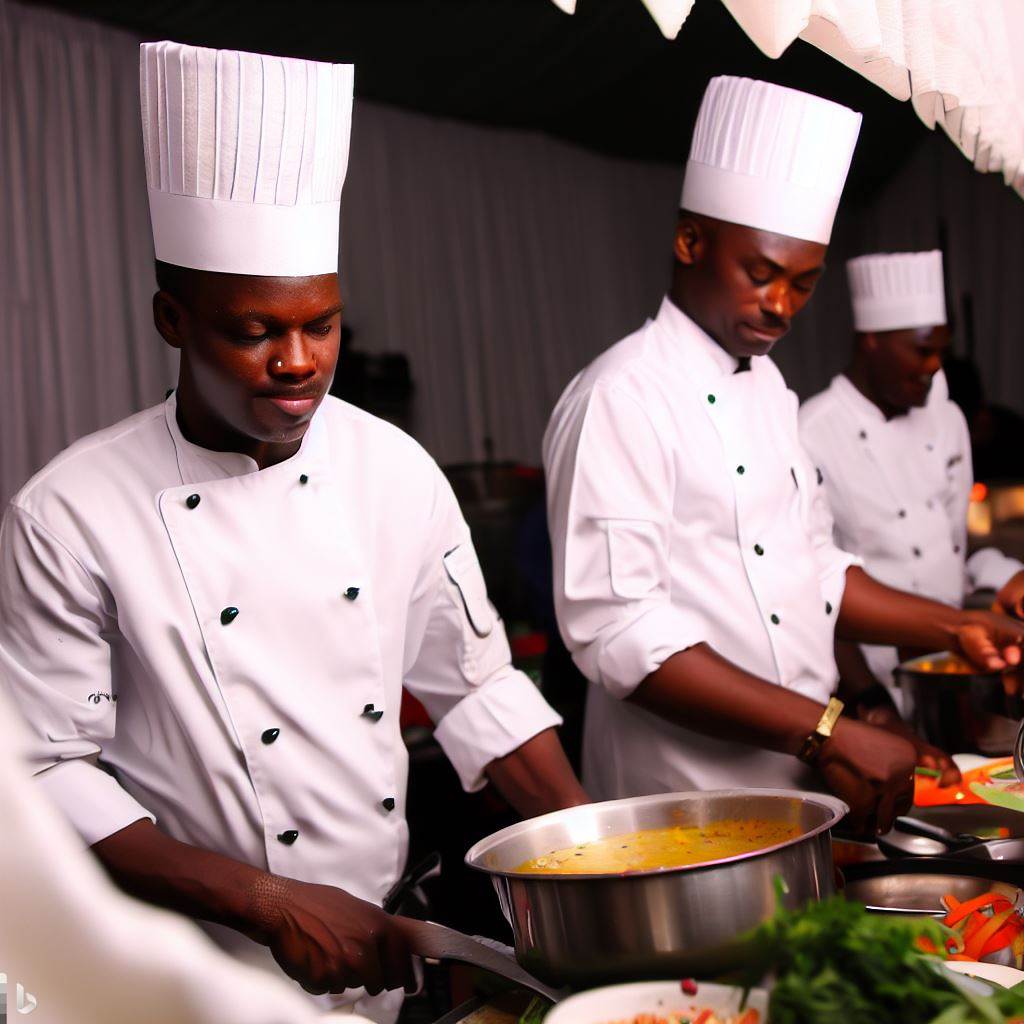Introduction
Nigerian cuisine is known for its unique and diverse specialties, making it a haven for food enthusiasts.
In this blog post, we will explore the delicious journey of Chef Specialties in Nigeria.
Our purpose is to showcase the rich culinary heritage of Nigeria and highlight the mouth-watering dishes that are a true reflection of this vibrant country.
Join us as we embark on an exciting exploration of the flavors and aromas that define Nigerian cuisine.
Traditional Nigerian Dishes
Nigerian cuisine is rich in flavors and offers a variety of Chef Specialties.
These traditional dishes are not only delicious but also hold a cultural significance in Nigerian cuisine.
A. The various traditional Nigerian dishes that are considered Chef Specialties
- Jollof Rice
- Egusi Soup
- Pepper soup
- Moi Moi
- Suya
- Efo Riro
- Akara
B. Description of each dish and its ingredients
- Jollof Rice: Jollof Rice is a popular staple in Nigeria, loved by locals and tourists alike.
It is made using long- grain rice, tomatoes, onions, peppers, and various spices. This flavorful dish is often served at celebrations and special occasions. - Egusi Soup: Egusi Soup is a thick and hearty soup made from ground melon seeds. It is cooked with various vegetables like spinach, bitter leaf, and sometimes with meat or fish.
This soup is often enjoyed with pounded yam or fufu, a dough-like staple made from cassava. - Pepper Soup: Pepper Soup is known for its spicy and aromatic flavors.
It is made by simmering meat, poultry, or fish with a blend of spices such as garlic, ginger, and chili peppers. - Moi Moi: Moi Moi is a steamed bean pudding made from grounded black-eyed peas, onions, peppers, and spices.
- Suya: Suya is a popular street food in Nigeria, loved for its grilled and spicy flavors.
It is made using skewered meat, usually beef or chicken, marinated in a blend of spices including peanut powder, chili pepper, and onion powder. - Efo Riro: Efo Riro is a vegetable soup that originated from the Yoruba tribe in Nigeria.
It is made using assorted green vegetables like spinach, kale, or pumpkin leaves. This flavorful dish is cooked with palm oil, onions, meat, and fish. - Akara: Akara, also known as bean cakes, is a popular Nigerian breakfast snack. It is made by deep-frying a mixture of peeled beans, onions, and spices.
C. The cultural significance of these dishes in Nigerian cuisine
These traditional Nigerian dishes hold a significant place in the country’s cuisine.
They reflect the diversity of Nigerian culture and showcase the vibrancy of its flavors.
These dishes are not only enjoyed for their taste but also for the cultural rituals and gatherings they are associated with.
In Nigerian households, the preparation of these Chef Specialties often involves the whole family, strengthening the bond between generations.
The knowledge and techniques passed down through generations ensure that these traditional dishes retain their authenticity and taste.
traditional Nigerian dishes play a role in various celebrations and cultural events.
They serve as symbols of unity and togetherness, bringing people closer and creating a sense of belonging.
The aroma of Jollof Rice at a wedding or the sizzling sound of Suya being grilled at a street corner adds to the festive atmosphere and acts as a culinary ambassador for Nigerian culture.
traditional Nigerian dishes like Jollof Rice, Egusi Soup, Pepper Soup, Moi Moi, Suya, Efo Riro, and Akara are considered Chef Specialties.
Transform Your Career in Nigeria
Discover unmatched expertise with our personalized Career Consulting service. Navigate Nigeria’s job market with a strategy tailored just for you.
Get StartedThese dishes not only tantalize taste buds but also represent the cultural heritage and diversity of Nigeria.
Trying these flavorful delights is a must for anyone seeking a delicious journey through Nigerian cuisine.
Read: Regulations & Compliance in Customer Service in Nigeria
Regional Variations and Specialties
Nigerian cuisine is a culinary delight that encompasses a wide range of regional variations and specialties.
Each region in Nigeria has its own unique dishes and flavors, making the country a food lover’s paradise.
A. Regional Variations
In Nigeria, the cuisine varies significantly from one region to another.
The north features popular street food like suya, consisting of grilled meat seasoned with a special spice blend.
Another specialty from the north is tuwo shinkafa, a thick porridge made from rice or maize, served with various soups.
Moving towards the southwest, you encounter dishes like jollof rice, which is a staple in Nigerian cuisine.
A one-pot dish, jollof rice, comprises rice, tomatoes, onions, and a blend of spices, creating a flavorful delight.
Other specialties from this region include pounded yam, efo riro (vegetable soup), and egusi soup made from melon seeds.
The southeast region offers a variety of delicacies, including oha soup made from oha leaves and ugba (ukpaka) soup, made from oil bean seeds.
Nkwobi, a spicy cow foot dish, is also popular in this region. The southeast is known for its rich and flavorful dishes.
Abundant seafood in Nigeria’s coastal region significantly influences its cuisine, enhancing the flavors and culinary traditions of the area..
Here, you will find delicacies like pepper soup, made from various types of meat or fish simmered in a spicy broth.
Seafood dishes like prawn suya and fisherman soup are also prominent in this region.
B. Distinctive Flavors and Ingredients
Each region in Nigeria uses distinctive flavors and ingredients to create its unique dishes.
The north utilizes a lot of spices, such as cloves, ginger, and garlic, to add warmth and depth of flavor to their dishes.
The southwest focuses on bold and tangy flavors with the use of tamarind, lemon, and chili peppers.
In the southeast, they enhance flavors with bitterleaf and potash, while the coastal region relies on fresh herbs and spices for seafood dishes.
C. The Importance of Diversity
The diversity in Nigerian cuisine is of utmost importance as it reflects the country’s multiculturalism.
With over 250 ethnic groups, Nigeria boasts diverse culinary traditions, each preserving its uniqueness and flavors.
Embracing this diversity means celebrating the rich heritage and history embedded in Nigerian cuisine.
Moreover, the regional variations and specialties provide a platform for culinary exchange and exploration.
Publish Your Professional Profile, Business or Brand
Showcase your expertise, gain trust, and boost visibility instantly on Professions.ng.
Publish NowIt allows people to experience a wide array of flavors, techniques, and ingredients.
This diversity is not only pleasing to the palate but also showcases the cultural richness of Nigeria.
exploring the regional variations and specialties of Nigerian cuisine is an exciting journey.
From the north to the coast, each region offers its own charm and unique dishes. The distinctive flavors and ingredients used in each region highlight the wealth of Nigerian culinary traditions.
Celebrating this diversity is essential as it showcases the country’s rich heritage and cultural heritage.
Read: Customer Service Education in Nigeria: Top Courses & Degrees
Fusion of Nigerian and International Influences
- International cuisines have greatly influenced Nigerian Chef Specialties, adding new flavors and techniques.
- One example of fusion dishes is jollof paella, combining Nigerian jollof rice with Spanish paella.
- Another fusion dish is suya tacos, which brings together Nigerian suya spice with Mexican tacos.
- A popular fusion dish is the Nigerian-style pizza, topped with local ingredients such as plantains and spicy suya.
- These fusion dishes not only showcase the rich flavors of Nigeria but also embrace global culinary techniques.
A. The influence of international cuisines on Nigerian Chef Specialties
The influence of international cuisines on Nigerian Chef Specialties has opened up a world of possibilities, creating a rich and diverse culinary landscape in the country.
These fusion dishes not only satisfy the taste buds but also celebrate the cultural exchange between Nigeria and the rest of the world.
B. Examples of fusion dishes that combine Nigerian flavors with international techniques
One of the most loved fusion desserts is the puff puff beignet, a French-inspired treat made with Nigerian puff puff dough.
This fusion dessert has gained popularity in both local and international food festivals.
Jollof sushi, a popular fusion dish, transforms jollof rice into sushi rolls, garnering significant attention and appreciation.
This blend of Nigerian and Japanese cuisines is a testament to the creativity of Nigerian chefs.
One popular fusion dish is the Naija burger, which incorporates Nigerian seasonings and spices into a traditional hamburger.
A distinctly Nigerian twist involves serving it with plantain as a side, enhancing its flavor profile.
C. Anecdotes and stories about popular fusion dishes and their origins
Chef Tunde, known for innovative fusion, introduced suya sushi, rolling suya-spiced fish into sushi rolls, showcasing culinary creativity.
This unique combination blends Nigerian flavors with the traditional Japanese technique of sushi-making.
Another interesting anecdote involves Chef Gbenga, who developed the recipe for Nigerian dumplings stuffed with shredded beef and vegetables, inspired by Chinese dumplings.
This dish became a hit among locals and tourists, showcasing the successful fusion of Nigerian and Chinese cuisines.
Many of these fusion dishes were born out of experimentation and a desire to create something new and exciting.
Chefs in Nigeria are constantly seeking ways to combine traditional Nigerian flavors with international techniques, resulting in unique and delicious culinary creations.
Read: Impact of COVID-19 on Customer Service in Nigeria: Analysis

Rising Star Chefs in Nigeria
A. Profiles of up-and-coming chefs in Nigeria who specialize in creating innovative Chef Specialties
These rising star chefs in Nigeria are making waves with their innovative approach to Chef Specialties.
With their unique cooking styles, signature dishes, and culinary achievements, they have significantly influenced the Nigerian food scene.
1. Zara Ahmed
- Specializes in fusing traditional Nigerian flavors with international culinary techniques.
- Her signature dish, the “Jollof Risotto,” is a unique twist on the classic Jollof rice.
- Culinary Achievement: Winner of the National Young Chef Competition in 2019.
2. Chinedu Okonkwo
- Masters the art of incorporating local Nigerian ingredients into modern fine dining.
- His signature dish, the “Egusi Gourmet Soup,” elevates the popular Egusi soup to a gourmet level.
- Culinary Achievement: Finalist on the reality cooking show “Nigeria’s Next Top Chef.”
3. Fatima Ibrahim
- Known for her innovative take on Nigerian street food, adding a creative touch to traditional favorites.
- Her signature dish, the “Coconut Puff Puff,” revolutionizes the popular Nigerian snack.
- Culinary Achievement: Featured in several international food magazines for her unique street food creations.
B. Their unique cooking styles, signature dishes, and culinary achievements
Zara Ahmed stands out for her ability to combine Nigerian flavors with international culinary techniques.
Her “Jollof Risotto” showcases her creativity in reinventing a classic dish.
Chinedu Okonkwo expertly merges local Nigerian ingredients with fine dining, earning renown for his culinary innovation and excellence.
The “Egusi Gourmet Soup” demonstrates his mastery of elevating traditional flavors to a gourmet level.
Fatima Ibrahim brings a fresh perspective to Nigerian street food by adding a creative touch to traditional favorites.
Her “Coconut Puff Puff” is a testament to her ability to transform a popular snack into something unexpectedly delicious.
C. The impact of these chefs on the Nigerian food scene
These rising star chefs have not only pushed culinary boundaries but have also garnered recognition for their skills.
Chef Zara Ahmed’s national win in the Young Chef Competition highlights her talent and dedication.
Chinedu Okonkwo’s appearance as a finalist on “Nigeria’s Next Top Chef” showcases his culinary excellence and potential to become a future culinary star.
Fatima Ibrahim has gained international recognition through features in food magazines, a testament to her creativity and contribution to the Nigerian food scene.
These rising star chefs have brought a new level of excitement and innovation to the Nigerian culinary landscape.
Their unique cooking styles, signature dishes, and culinary achievements have undoubtedly made an impact on the Nigerian food scene, inspiring other young chefs and changing the perception of Nigerian cuisine both locally and internationally.
Read: Building a Career in Customer Service in Nigeria: A How-To
Experiencing Chef Specialties in Nigeria
A. Tips and Recommendations for Experiencing Chef Specialties in Nigeria Firsthand
- Embrace the Street Food Culture: When in Nigeria, don’t miss the chance to try the mouthwatering chef specialties sold by street food vendors.
- Interact with the Locals: Strike up conversations with the locals to get insider tips on the best places to experience authentic Nigerian chef specialties.
- Explore Food Markets: Visit popular food markets like Lagos Island Market, Mushin Market, and Utako Market to sample a wide variety of chef specialties.
- Be Adventurous with Your Choices: Nigeria offers a diverse range of chef specialties, so step out of your comfort zone and try something new and unique.
- Attend Food Festivals and Events: Keep an eye out for food festivals and events that showcase Nigerian cuisine and its chef specialties.
It’s a fantastic way to immerse yourself in the food culture.
B. Popular Food Markets, Restaurants, and Street Food Stalls that Offer Chef Specialties
- Jollof Rice Joints: Try Mama Cass, Terra Kulture, and Nkoyo for delectable jollof rice, a famous Nigerian dish loved for its rich flavors.
- Suya Stalls: For succulent grilled meat on skewers, visit suya stalls like Kilishi Express, Suya Heaven, and Suya Spot.
- Ewa Agoyin Stands: Indulge in Ewa Agoyin, a spicy mashed bean dish, at stands such as Iya Eba, Agoyin Kitchen, and White Label Ewa Agoyin.
- Amala Restaurants: Pamper your taste buds with Amala, a traditional Nigerian dish made from yam flour, at eateries like Buka Hut, Amala Place, and Yellow Chilli.
- Akara Spots: Visit popular Akara spots such as Olaiya Food Canteen, Agodi Gardens Restaurant, and Delightsome Land for delicious bean cakes.
C. Immersive Food Tours and Cultural Experiences centered around Nigerian Cuisine
- Nigerian Food Tours: Take guided food tours led by local experts who will introduce you to diverse chef specialties across various regions of Nigeria.
- Cooking Classes: Join cooking classes where experienced chefs will teach you how to prepare traditional Nigerian dishes, including chef specialties.
- Cultural Festivals: Attend cultural festivals like the Eko International Food and Drink Festival and the Calabar Carnival to experience Nigerian cuisine in all its glory.
- Village Visits: Explore rural areas and visit local villages to witness the preparation of chef specialties using traditional cooking methods and ingredients.
- Culinary Workshops: Participate in hands-on culinary workshops where you can learn the techniques and secrets behind Nigerian chef specialties.
Experiencing chef specialties in Nigeria is an adventure that shouldn’t be missed.
Follow these tips, explore the popular food markets, restaurants, and street food stalls, and participate in immersive food tours to truly savor the diverse flavors of Nigerian cuisine.
Don’t forget to engage with the locals and embrace the rich food culture that Nigeria has to offer. Bon appétit!
Conclusion
In this blog post, we discussed the Chef Specialties in Nigeria that take us on a delicious journey.
We discovered the mouth-watering flavors and unique combinations that showcase the richness of Nigerian cuisine.
Publish Your Professional Profile, Business or Brand
Showcase your expertise, gain trust, and boost visibility instantly on Professions.ng.
Publish NowA. The key points discussed in the blog post
From the jollof rice, a staple in Nigerian households, to the aromatic egusi soup, each Chef Specialty presents a burst of flavors that reflect the diversity of Nigeria’s culinary heritage.
B. Importance of Chef Specialties in showcasing the richness of Nigerian cuisine
Chef Specialties are not just dishes; they tell stories of tradition, innovation, and the love Nigerians have for their food.
They are a testament to the passion and creativity of Nigerian chefs.
C. Exploring and Appreciating the diverse flavors of Nigeria through these specialties
We encourage our readers to explore and appreciate the diverse flavors of Nigeria through these specialties.
Whether it’s trying the spicy suya, the savory porridge, or the delicate puff puff, each bite will transport you to the vibrant streets and bustling markets of Nigeria.
By supporting and indulging in Chef Specialties, we not only satisfy our taste buds, but also contribute to the preservation and promotion of Nigerian culture.
So let’s savor the unique pleasures that these specialties have to offer and celebrate the culinary wonders of Nigeria.




